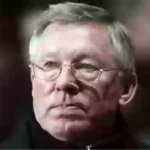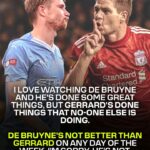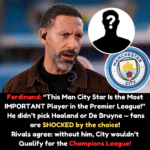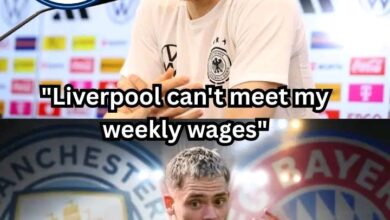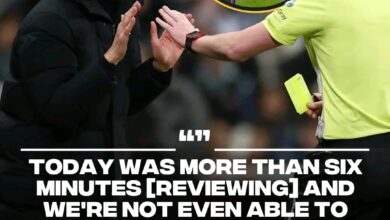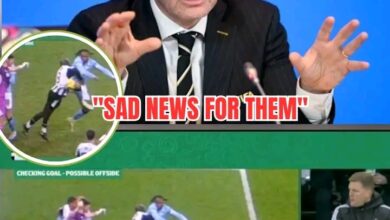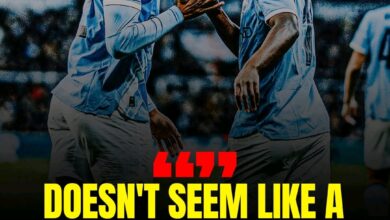Sir Alex Ferguson told player ‘you’ll never play for Man Utd again’ after he swapped shirts following derby defeat to City
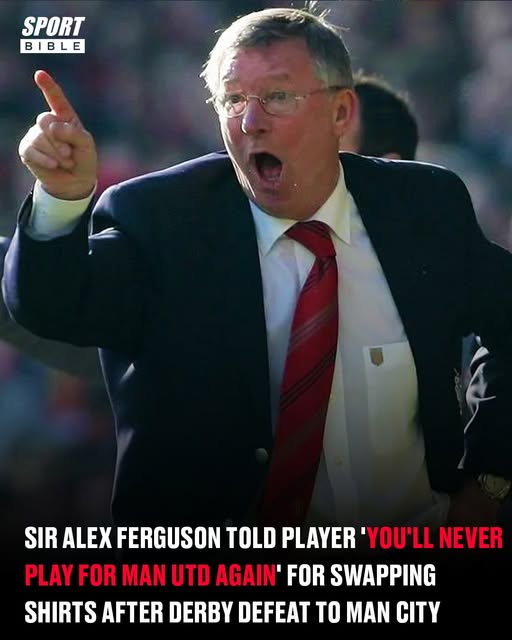
In 2002, one of the most intense moments of Sir Alex Ferguson’s reign as Manchester United manager occurred when he delivered a blistering rebuke to one of his star players after a derby loss to Manchester City. This moment, which involved a shirt swap, highlighted Ferguson’s no-nonsense approach to discipline and his obsessive commitment to winning at all costs, especially in the context of the Manchester derby.
The game in question took place at Maine Road, City’s home stadium before they moved to the Etihad. It was Rio Ferdinand’s first-ever Manchester derby as a United player, after his record-breaking £30 million transfer from Leeds. Expectations were high, with United the overwhelming favorites to win. However, what followed was a humbling defeat. City triumphed 3-1, with Shaun Goater scoring twice and Nicolas Anelka adding another for the home side. United’s only goal came from Ole Gunnar Solskjaer, but the match’s aftermath would leave a lasting impression on the players, particularly Ruud van Nistelrooy.
Van Nistelrooy, the prolific Dutch striker who was United’s top scorer at the time, became the center of controversy after the match. Despite the disappointing result, he was seen walking into the dressing room holding a Manchester City shirt, something that deeply angered Sir Alex Ferguson. The manager, known for his strict disciplinary methods, was infuriated by the gesture. As soon as the players entered the locker room, Ferguson closed the door behind them, and the atmosphere quickly shifted. The room fell silent, only for Ferguson to erupt, venting his anger at Van Nistelrooy. He reportedly said, “If I ever see any of you walking with a City shirt ever again, you’ll never play for this club.”
This incident shocked many in the room, with Ferdinand recalling how it was the moment he truly grasped the magnitude of the rivalry between Manchester’s two clubs. For the first time, he understood the intensity of a Manchester derby, recognizing that for Ferguson, it was a match of utmost importance. In that moment, the game went beyond just three points—it became a matter of club pride and tradition.
Ferguson’s reaction was not just about Van Nistelrooy’s actions but also reflected his broader philosophy. He was highly protective of United’s image and the values he wanted his players to uphold. Swapping shirts with an opponent, especially one from a team like Manchester City, was seen as disrespectful to the badge and the fans. Ferguson wanted his players to be focused, determined, and loyal, especially when it came to matches against their fiercest rivals. It became clear that for him, the derby wasn’t just another game—it was a battle that transcended the 90 minutes on the pitch.
The fallout from the incident led to Ferguson implementing stricter rules regarding shirt swapping in domestic matches. Van Nistelrooy’s actions may have been unintentional, but they served as a stark reminder to Ferguson that discipline was crucial in maintaining the culture of success at Manchester United. According to former United captain Gary Neville, the manager’s fury after this incident set a precedent, and players were discouraged from engaging in the practice after domestic games, particularly against rivals like City.
Despite the tension between Van Nistelrooy and Ferguson, the striker continued to be a key player for United. In the return fixture later that season, Van Nistelrooy scored a goal, though City earned a late point through Goater’s header. Van Nistelrooy went on to score 150 goals in 219 appearances for United over five seasons, making him one of the club’s most prolific forwards. However, by the end of his time at Old Trafford, relations between the two men had soured. In 2011, Van Nistelrooy revealed that he had sought out Ferguson to apologize for his behavior in the final stages of his United career, acknowledging that his relationship with the manager had become strained.
Van Nistelrooy’s eventual departure to Real Madrid marked the end of a highly successful era for him at United. He left behind a legacy as one of the best strikers to ever play for the club, but his time at United was not without its challenges. Still, the moment when he swapped shirts with a City player and received Ferguson’s wrath remained one of the most iconic episodes in the history of the Manchester derby. It was a reminder of the fierce commitment to Manchester United that Ferguson demanded from his players, especially when it came to the club’s most important rivalries.
In the years since, the rivalry between Manchester United and Manchester City has evolved, but Ferguson’s commitment to winning the derby never wavered. Under his leadership, United consistently dominated City, even as the club began to challenge United’s supremacy in the Premier League in the years after Ferguson’s departure. However, this incident with Van Nistelrooy in 2002 remained a symbol of Ferguson’s mentality—his unwavering focus on success and his belief that players should never lose sight of what it means to wear the Manchester United shirt.
Looking back, Van Nistelrooy’s shirt swap might seem like a minor incident, but for Sir Alex Ferguson, it was a moment that epitomized the larger-than-life nature of the Manchester derby and the standards he set at Manchester United. The emotional intensity of that day, and Ferguson’s response to the perceived slight, highlighted just how seriously the manager took every game and how deeply he understood the importance of preserving United’s legacy, particularly when facing their most bitter rivals.
Ferguson’s reaction to Van Nistelrooy’s shirt swap was one of the many instances that demonstrated the manager’s intense passion for the game, his players, and the club he loved. For Ferguson, Manchester United wasn’t just a football club—it was a symbol of pride, tradition, and superiority. And anyone who didn’t understand that, as Van Nistelrooy learned, would quickly feel the full force of Sir Alex Ferguson’s wrath. The event was a pivotal moment in the rivalry, a reminder of just how high the stakes were in the battle for Manchester supremacy.

